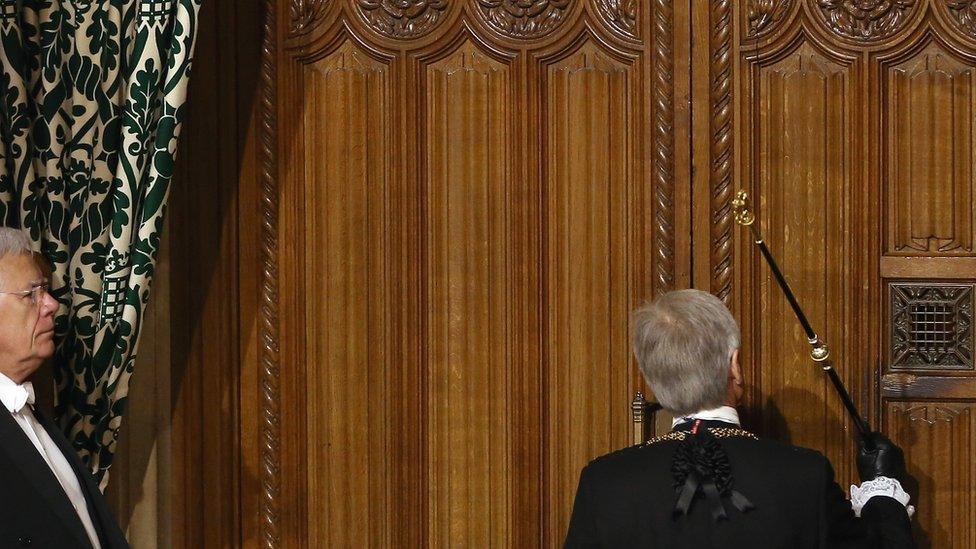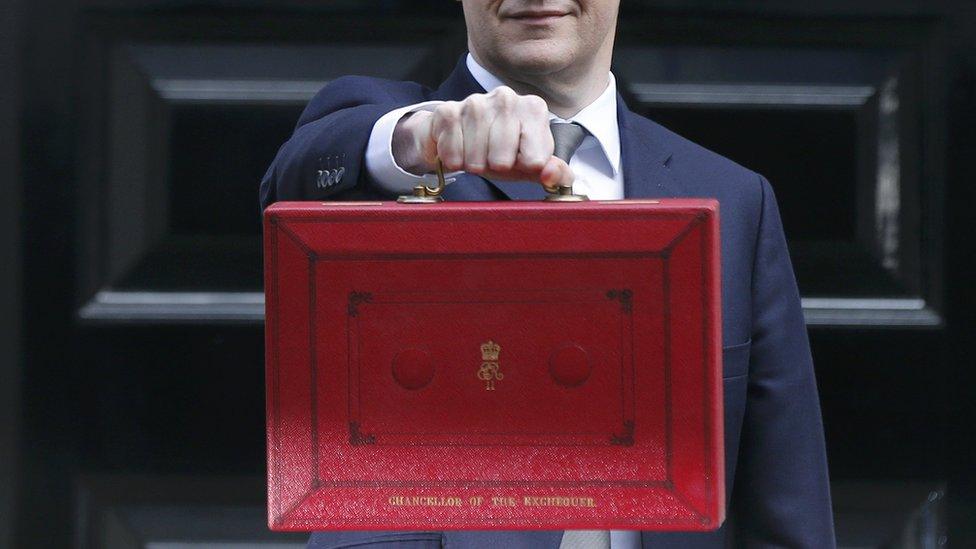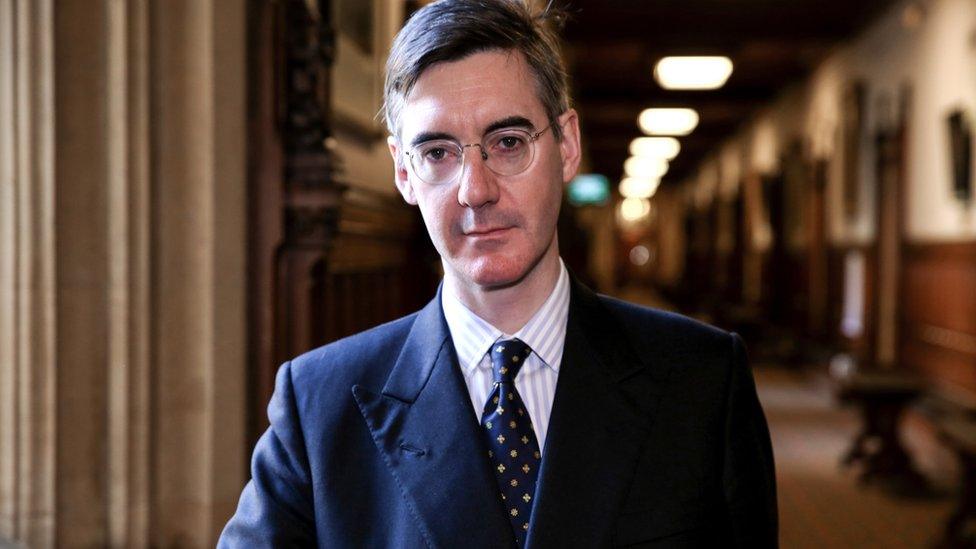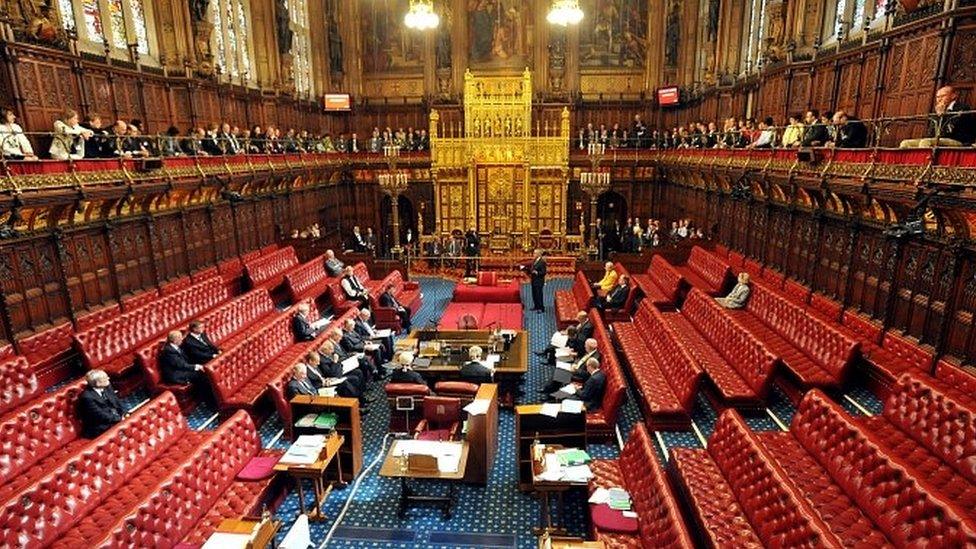Lords v Commons: Tax credit battle gets constitutional
- Published

The government has been defeated in the House of Lords over its plans to cut tax credits in what is being described as a constitutional crisis. What's going on?
Anger over tax credits
The House of Commons has already given its backing to tax credit cuts, despite bitter opposition from Labour, the SNP and some Conservative MPs.
David Cameron says the cuts are part of a grander plan to boost wages and take the low paid out of tax, but the IFS says millions of families will be left out of pocket.
Mr Cameron won the day in the elected Commons, where he has a slender majority.
But he was defeated in the unelected House of Lords, where he is far short of a majority. Policies have to get the backing of both houses before they can become law.
Lib Dem and Labour peers joined forces with some non-party crossbenchers and bishops, who also sit in the Lords, to wreck one of Chancellor George Osborne's flagship policies.
Peers voted by a majority of 17 to back Labour calls for the government to provide full financial redress to the millions of tax credit claimants who will be affected when their entitlements are reduced.
Peers inflicted a second defeat by backing a delay in the cuts until an assessment of their financial impact is carried out.

Constitution wars
The House of Lords is not traditionally supposed to block financial legislation that has the backing of MPs.
This principle was established in 1911 during the constitutional gridlock that followed a decision by peers to block the Liberal Party's "people's budget".
But nothing is ever cut and dried in Britain's fluid, unwritten constitution. And both sides are angrily trading precedents and claiming that their opponents are overstepping the mark. If they could only agree where the mark is.

The Lords does not traditionally block financial legislation approved by the Commons
"The House of Lords is trying to grab a new power from the House of Commons over financial matters. This is an unprecedented challenge to the authority of the House of Commons," a Conservative source told the BBC's James Landale.
The government's opponents point to examples when Statutory Instruments - the type of legislation chosen by ministers to cut tax credits - have been blocked in the past.
But ministers insist elected politicians must always have the upper hand over appointed Lords when it comes to financial matters.
Flooding the Lords with Tory peers
David Cameron immediately launched a "rapid review" to deal with the constitutional implications of the defeat and more details of that will be set out later. His spokesman said a convention had been broken and there would be a move to "put it back in place".
Mr Osborne made clear that the implications of the defeat would "need to be dealt with" and moves to rein in the Lords are expected.
Mr Cameron is the first Conservative prime minister not to have a majority in the House of Lords and he has threatened to appoint dozens of new Conservative peers to ensure he gets his way in future.
His official spokesman has refused to rule out such a move, although the fact that he would need to recruit 150 or more suggests it is not too plausible.
Tory backbencher and keen constitutional student Jacob Rees-Mogg says he would back a plan to flood the House with Tory peers, arguing that it would bring the Lords into "disrepute" with the public, triggering reforms.

Conservative MP Jacob Rees-Mogg says MPs should have the final say on financial matters
He insists the convention that elected politicians have the final say over financial matters dates back to the 15th Century.
Lib Dem chief whip Lord Newby, whose party failed in its bid to block the tax credit cuts with a so-called "fatal motion" has accused Mr Cameron of behaving like a "school bully" and riding roughshod over the appointed House of Lords.
But he is also keen on the idea of a constitutional crisis. He told the BBC's Daily Politics that if the PM followed through on his threats it "would produce the kind of reform for which we have been arguing for decades".
The House of Lords is already the world's largest legislative body - there are not enough seats in the chamber for the 826 peers entitled to sit there.
Further Lords v Commons battles

The government does not have a majority in the House of Lords
On Tuesday, Mr Cameron faces two more attempts to strike down regulations proposed by the government - and both may well succeed.
Lib Dem Lord Tyler is targeting a change in electoral registration rules and his party colleague, Lady Hamwee, takes on ministers over benefits for asylum seekers.
Labour are fired up about the electoral registration issues, and have just had a weekend of action aimed at signing up new voters.
They fear the change will remove 1.9 million people from the electoral register in time for next year's elections to the Scottish Parliament, the Welsh Assembly and the Mayor of London.
Lord Tyler says there can be no constitutional quibble about the motion he has tabled on Tuesday, and that Conservatives have "prayed to annul" similar Statutory Instruments, as such rule changes are known, in past Parliaments. And then watch out for amendments to the EU Referendum Bill which could allow 16 and 17-year-olds a referendum vote in England and Wales.
Most rebellious Lords session ever?
There have been 17 defeats in the Lords since May and it looks to be one of the most rebellious sessions on record.
There has been a defeat on every piece of legislation that has come through the Lords; the Cities and Local Government devolution bill, the Charities Bill, the Childcare Bill and the Psychoactive Substances Bill. After Tuesday night's defeat, the government has been defeated in 75% of votes in the Upper House - an extraordinary number.